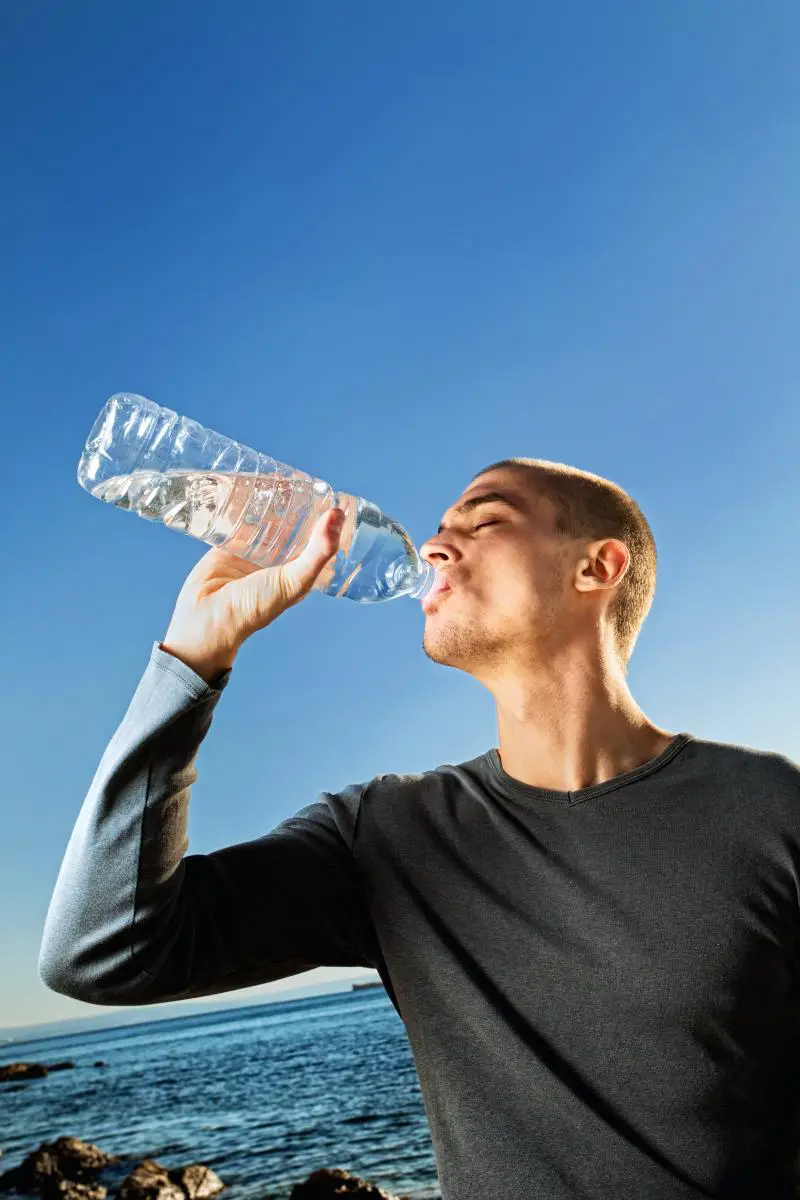The thermostat is turning up here in NYC as summer is approaching on June 20th. Since the COVID-19 pandemic began, people are paying more attention to their gut health than ever. Studies show we have up to 1,000 species of bacteria in the human gut microbiome weighing as much as 2–5 pounds (1–2 kg); each of them extremely important in determining your current and future health status[1]. Since 70% of your immune system comes from your gut, here are my five gut healthy tips to stay healthy this summer:


Photo by Damir Spanic on Unsplash.
Hydrate, Hydrate, Hydrate!!!
The type of water, where it comes from, and what you drink out of matters. Also, how much should you drink and what types of foods can you consume to stay hydrated? Let’s take a look:
- Drinking out of glass is superior
Most metal water bottles are marketed as stainless steel, but many of them are made from aluminum, a neurotoxin [2] (like Mercury [3] or lead [4]), known to lead to Alzheimer’s Disease. Aluminum water bottles may also be lined with plastic, even if “BPA -Free,” often replaced with BPS or BPF which are hormone-disrupting [5]. Therefore, glass water bottles are the superior in being leach proof from harmful metals, plastics and preserves your overall gut health and beverage taste untainted by weird residual flavors. - Mineral water vs. Alkaline water
Mineral water is a protected underground source delivering magnesium, calcium, sodium, and other beneficial minerals as well as trace elements naturally unaltered. Mineral water builds and maintains strong bones and nerve function [6]. Studies also show mineral water to have positive effects on intestinal gut microbiota on anti-obesity, intestinal abnormal fermentation, acid indigestion, chronic diarrhea, constipation, dyspepsia, lipid metabolism, and glucose metabolism in patients with Type 2 diabetes compared to drinking tap water [7]. The PH of Mineral water is neutral which is how our bodies are intended to consume our water source.
Unlike Mineral water, Alkaline water typically with a PH of 9.5 and above, lowers your natural stomach acidity of 1.5-3.5, which helps kill gut bacteria and expel other undesirable pathogens from entering your bloodstream. - How much water should you drink based on your weight?
Take your weight (in pounds)
Divide your weight in half (in pounds)
Divide that figure (in pounds) by half to get your water intake in ounces.
* For example, your weight is 100 pounds, divide that by 2, which gives you 50 ounces (oz). This means you should be drinking 50 oz (or 1.42 liters) each day. (Note: More conclusive research is needed to conclude water consumption in larger body weight individuals [8].) - Hydrate through Fruits and Veggies
The perfect structure of hydration is not only found in mineral water, but also in consuming fruits and veggies [9]:
* Consume these Hydrating Fruits such as watermelon, grapefruit and strawberries.
* Consume these Hydrating Veggies such as cucumber, celery and leafy greens such as spinach, kale, iceberg and romaine lettuce.
Visit Your Local Farmers Market to Eat in Season!
- Eating the same foods is not only boring and but lacks the biodiversity our microbes need to be healthy. Foods grown out of season requires chemicals, gases, and heat processes versus allowing the natural growing and ripening rhythms. This causes artificially ripened produce to be not as nutritious or tasty as naturally ripened produce.
- One study measuring the Vitamin C content found that broccoli grown during its peak season fall had a higher vitamin C content than broccoli grown during the spring [10]. Help support your local farmers while optimizing your gut health! See the IFM (Institute for Functional Medicine) Seasonal Foods by U.S. Region and get to know which foods grow in your geographic region at any given time of year. The following tables break down the growing seasons by region in the contiguous United States (the 48 adjoining states).
Exercise Your Gut Health!
Increasing evidence suggests that regular aerobic exercise confers benefits to the gut microbiota, which may be partially responsible for the widespread benefits of regular physical activity on obesity and metabolic disease, inflammatory bowel disease, colorectal cancer, and mental and cognitive health [11].
- Train Early AM and PM - Exercising outside midday can be brutal. To avoid the excessive heat, dehydration and the possibility of heat stroke, training in the early am or pm will allow your body to workout harder and smarter without overheating [12].
- Train your Muscles Clocks - Just like we have a circadian rhythm for our sleep cycle, we also have muscle clocks working to synchronize skeletal muscle activity to the master clock located in the brain. Sticking to a regular workout schedule allows muscle clocks to do their jobs to improve muscle performance, synchronize muscles to other body systems, and increase your overall gut health and fitness [13]!
Soak Up the Sun!
- Summer is best known for long sunshine-filled days! They’re a great way to get your daily dose of Vitamin D naturally. Vitamin D is absorbed through the skin, gets stored in the body’s fat cells and then converted by the liver and kidneys into the active form the body needs. Studies show it is estimated we should get 90% of our Vitamin D through sunlight, supporting optional gut health and aiding in preventing autoimmune diseases, cancers, and cardiovascular disease [14].
- Although the daily recommended intake of Vitamin D for an average adult is 2,500-5,000 IU, ideally if you want to increase your vitamin D, expose your skin to the sun closer to midday to allow for maximum production. According to the national Institutes of Health [15] between five and 30 minutes of sun exposure to your unprotected face, arms, legs or back between the hours of 10 a.m. and 3 p.m. two to three times every week is enough for your body to produce all of the D3 it needs. Since, sunscreen can block Vitamin D production, the best way to avoid sunburn but still acquire your daily dose of vitamin D - head out for 10-15 minutes during the hours of 10 a.m. - 12 p.m. then another 10-15 minutes during the hours of 1 p.m. - 2 p.m. and another 15 minutes from 3 p.m. - 4 p.m. Keep in mind a dark-skinned person might need 10 times more sun exposure than a lighter-skinned person to produce the same amount of Vitamin D hence needing more sun exposure to soak up the rays!
Get Proper Sleep!
- Sleep is the number one underestimated and underutilized component to having optimal gut health. In the study “Gut microbiome diversity is associated with sleep physiology in humans” [16] found the total microbiome diversity was positively correlated with increased sleep efficiency and total sleep time and linkages between gut microbiome composition, sleep physiology, the immune system and cognition all improved with good sleep hygiene.
- Exercising and acquiring your daily dose of Vitamin D also contributes to healthy solid sleep, with increased production of serotonin and melatonin production respectively.
- Here are some gut health tips on getting a good night’s sleep:
- A strict bed time/wake time will enhance the function of enzymes, hormones, and healing process in the gut.
- Set the alarm to go to sleep and wake up at the same time each day to get consistent circadian rhythm.
- Avoid all electronics (blue-light), and WIFI one hour prior to bed as it can affect your body's ability to prepare for sleep because it blocks a hormone called melatonin that makes you tired and ready for bed.
- The National Sleep Foundation guidelines [17] advises healthy adults need between 7 and 9 hours of sleep per night. Babies, young children, and teens need even more sleep to enable their growth and development. People over 65 should also get 7 to 8 hours per night.
References
- Integrative HMP (iHMP) Research Network Consortium. The Integrative Human Microbiome Project: dynamic analysis of microbiome-host omics profiles during periods of human health and disease. Cell Host Microbe. 2014;16(3):276–289.doi:10.1016/j.chom.2014.08.014.
- BfR (Bundesinistitut für Risikobewertung) Aluminiumhaltige Antitranspiranzien tragen zur Aufnahme von Aluminium bei. Stellungnahme. Nr. 007/2014 des Bundesinstituts für Risikobewertung vom 26. Februar 2014. www.bfr.bund.de (last accessed on 21 July 2017) [Google Scholar]
- Siblerud R, Mutter J, Moore E, Naumann J, Walach H. A Hypothesis and Evidence That Mercury May be an Etiological Factor in Alzheimer's Disease. Int J Environ Res Public Health. 2019;16(24):5152. Published 2019 Dec 17. doi:10.3390/ijerph16245152
- Bakulski KM, Rozek LS, Dolinoy DC, Paulson HL, Hu H. Alzheimer's disease and environmental exposure to lead: the epidemiologic evidence and potential role of epigenetics. Curr Alzheimer Res. 2012;9(5):563-573. doi:10.2174/156720512800617991
- Rubin BS. Bisphenol A: an endocrine disruptor with widespread exposure and multiple effects. J Steroid Biochem Mol Biol. 2011 Oct;127(1-2):27-34. doi: 10.1016/j.jsbmb.2011.05.002. Epub 2011 May 13. PMID: 21605673.
- Bohmer H, Müller H, Resch KL. Calcium supplementation with calcium-rich mineral waters: a systematic review and meta-analysis of its bioavailability. Osteoporos Int. 2000;11(11):938–43.
- Takaaki Yahiro, Takao Hara, Takashi Matsumoto, Emi Ikebe, Nichole Fife-Koshinomi, Zhaojun Xu, Takahiro Hiratsuka, Hidekatsu Iha, Masafumi Inomata, "Long-Term Potable Effects of Alkalescent Mineral Water on Intestinal Microbiota Shift and Physical Conditioning", Evidence-Based Complementary and Alternative Medicine, vol. 2019, Article ID 2710587, 10 pages, 2019. https://doi.org/10.1155/2019/2710587
- Baird ML, Oakley P. Do Patients Drink Enough Water? Actual Pure Water Intake Compared to the Theoretical Daily Rules of Drinking Eight 8-Ounce Glasses and Drinking Half Your Body Weight in Ounces. July 2015Journal of Water Resource and Protection 7(11):883-887. DOI:10.4236/jwarp.2015.711072
- https://www.medicalnewstoday.com/articles/325958#summary
- Wunderlich SM, Feldman C, Kane S, Hazhin T. Nutritional quality of organic, conventional, and seasonally grown broccoli using vitamin C as a marker. Int J Food Sci Nutr. 2008 Feb;59(1):34-45. doi: 10.1080/09637480701453637. PMID: 17852499.
- Mailing, Lucy J.1; Allen, Jacob M.2; Buford, Thomas W.3; Fields, Christopher J.4; Woods, Jeffrey A.1,5Author Information PERSPECTIVES FOR PROGRESS Exercise and the Gut Microbiome: A Review of the Evidence, Potential Mechanisms, and Implications for Human Health. Exercise and Sport Sciences Reviews: April 2019 - Volume 47 - Issue 2 - p 75-85 doi: 10.1249/JES.0000000000000183
- Périard JD, Racinais S, Sawka MN. Adaptations and mechanisms of human heat acclimation: Applications for competitive athletes and sports. Scand J Med Sci Sports. 2015 Jun;25 Suppl 1:20-38. doi: 10.1111/sms.12408. PMID: 25943654.
- Mayeuf-Louchart, A., Staels, B., & Duez, H. 2015. Skeletal muscle functions around the clock. Diabetes, Obesity, and Metabolism, 17 (1, Suppl.), 39–46.
- Holick MF. Sunlight and vitamin D for bone health and prevention of autoimmune diseases, cancers, and cardiovascular disease. Am J Clin Nutr. 2004 Dec;80(6 Suppl):1678S-88S. doi: 10.1093/ajcn/80.6.1678S. PMID: 15585788.
- https://ods.od.nih.gov/factsheets/VitaminD-HealthProfessional/
- Smith RP, Easson C, Lyle SM, et al. Gut microbiome diversity is associated with sleep physiology in humans. PLoS One. 2019;14(10):e0222394. Published 2019 Oct 7. doi:10.1371/journal.pone.0222394
- Hirshkowitz, M., Whiton, K., Albert, S. M., Alessi, C., Bruni, O., DonCarlos, L., Hazen, N., Herman, J., Katz, E. S., Kheirandish-Gozal, L., Neubauer, D. N., O'Donnell, A. E., Ohayon, M., Peever, J., Rawding, R., Sachdeva, R. C., Setters, B., Vitiello, M. V., Ware, J. C., & Adams Hillard, P. J. (2015). National Sleep Foundation's sleep time duration recommendations: methodology and results summary. Sleep health, 1(1), 40–43.https://doi.org/10.1016/j.sleh.2014.12.010
For more content and information check out wellnesscouturenyc.com.






